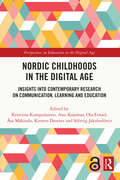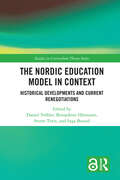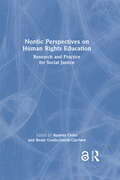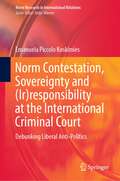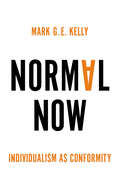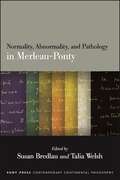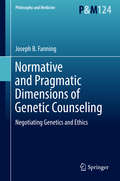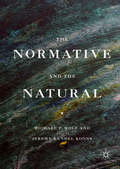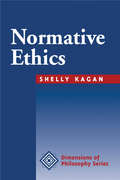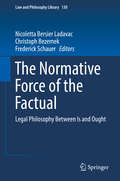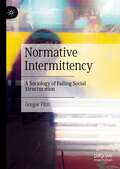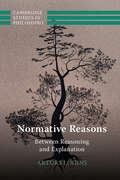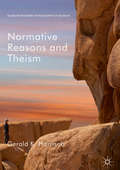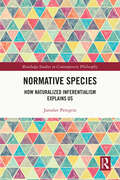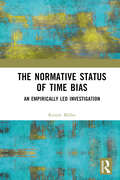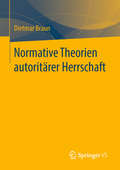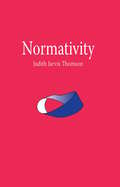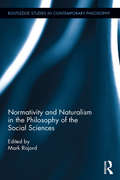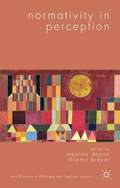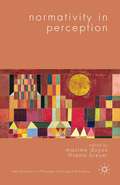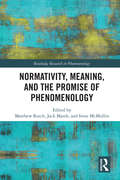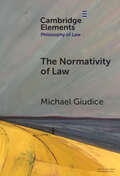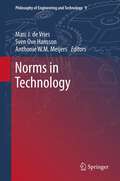- Table View
- List View
Nordic Childhoods in the Digital Age: Insights into Contemporary Research on Communication, Learning and Education (Perspectives on Education in the Digital Age)
by Kristiina Kumpulainen Anu Kajamaa Ola Erstad Åsa Mäkitalo Kirsten Drotner Sólveig JakobsdóttirThis book adds to the international research literature on contemporary Nordic childhoods in the context of fast evolving technologies. Bringing together researchers from Finland, Norway, Sweden, Denmark and Iceland, it addresses pressing issues around children’s communication, learning and education in the digital age. The volume sheds light on cultural values, educational policies and conceptions of children and childhood, and child-media relationships inherent in Nordic societies. Chapters investigate both formal education and everyday informal spaces as research sites. The book argues for the importance of understanding local cultures, values and communication practices that make up contemporary digital childhoods and extends current discourses on children’s screen time to bring in new insights about the nature of children’s digital engagement. This book will appeal to researchers, scholars, post graduate students and policy makers in the fields of childhood education, educational technology and communication. It will also be of interest to those studying and teaching in communication studies, learning and educational sciences at a higher level.
The Nordic Education Model in Context: Historical Developments and Current Renegotiations (Studies in Curriculum Theory Series)
by Daniel Tröhler Bernadette Hörmann Sverre Tveit Inga BostadTracing historical and cultural factors which gave rise to the Nordic Education Model, this volume explores why Northern European education policy has become an international benchmark for schooling. The text explains the historical connection between a Nordic ideal of democracy and schooling, and indicates how values of equality, welfare, justice, and individualism might be successfully integrated in national school systems and curricula around the world. The volume also highlights recent debates around the longevity of the Nordic model and explores the risks and challenges posed by international policy and assessment agendas. Exploring how Nordic education polices successfully merge social equity with academic excellence, the book combines cultural, historical, sociological and philosophical analysis with a deep exploration of curriculum and teaching. This book will be of great interest to researchers, scholars, and postgraduates working across the fields of curriculum, comparative education, cultural studies and history and philosophy of education and education policy.
Nordic Perspectives on Human Rights Education: Research and Practice for Social Justice
by Audrey OslerBacked by a range of case studies and recent developments in human rights education research, Nordic Perspectives on Human Rights Education guides readers through an analysis of educational inequities and identifies how internationally agreed-upon human rights standards may inform social justice practices within schools.In an age characterised by authoritarianism and extremism, but also social and climate justice movements, this book provides a critical analysis of current practice within schools. Contributing authors also discuss how a human rights framework may improve practice, supporting intersectional thinking and more sustainable learning environments, while also empowering teachers to confidently navigate issues of gender, national identity and minority rights.Divided into three distinct sections, chapters invite readers to consider: The context behind human rights education (HRE) Rights-based approaches to teaching and education International dialogue and how we may learn from the approaches of other countries. Drawing on research from the Nordic region, and discussing its implications elsewhere, this volume is an essential resource for scholars developing theory and practice in human rights education, social studies, citizenship education and international and comparative education.Chapter 2 of this book is freely available as a downloadable Open Access PDF at http://www.taylorfrancis.com under a Creative Commons Attribution (CC-BY) 4.0 license.Chapters 1, 6, 7, 9, 12 and 13 of this book are freely available as a downloadable Open Access PDF at http://www.taylorfrancis.com under a Creative Commons Attribution-Non Commercial-No Derivatives (CC-BY-NC-ND) 4.0 license.
Norm Contestation, Sovereignty and: Debunking Liberal Anti-Politics (Norm Research in International Relations)
by Emanuela Piccolo KoskimiesGrappling specifically with the norm of sovereignty as responsibility, the book seeks to advance a critical constructivist understanding of norm development in international society, as opposed to the conventional – or liberal – constructivist (mis)understanding that still dominates the debate. Against this backdrop, the book delves into the institutionalization of sovereignty as responsibility within the lived practice of the International Criminal Court (ICC). More to the point, the proposed exploration intends to revive questions about the power-laden nature of the normative fabric of international society, its dis-symmetries, and its outright hierarchies, in order to devise an original framework to operationalize research on how – institutional – practice impinges on norm development. To this end, the book resorts to an original creole vocabulary, which combines the contributions of post-positivist constructivist scholars with the legacy of key post-modernist thinkers such as Michel Foucault and Jacques Derrida, as well as critical approaches to International (Criminal) Law and Post-Colonial Studies. The book will appeal to scholars of international relations and international law, in addition to critical scholars more broadly, as well as to practitioners in the fields of human rights and international justice interested in normative theory and the implementation and contestation of international social norms.
Normal Now: Individualism as Conformity
by Mark G. KellyThis is a book about what we consider normal. It details how the very concept of normality emerged in the modern era, and how it has changed over the centuries. By the mid-twentieth century, the expansion of norms across various areas of human endeavour generated a governing normative order in Western societies. Normality was defined as conformity with a narrow model of conventional human behaviour. However, this model has since been displaced by an anti-conformism, in which normality is defined as absolute self-fulfilment, defying older restrictions on our behaviour. Paradoxically, narcissistic individualism and rebellion against conformity have become compulsory. Normal Now explores in detail how this new normative order plays out today in the arenas of politics, health, and sex and sexuality. In all these areas, the uncompromising perfectionism of our norms of self-expression leads to increasingly deep-seated and ubiquitous anger, anxiety and dissatisfaction.
Normality, Abnormality, and Pathology in Merleau-Ponty (SUNY series in Contemporary Continental Philosophy)
by Susan Bredlau; Talia WelshMaurice Merleau-Ponty’s work draws our attention to how the body is always our way of having a world and never merely a thing in the world. Our conception of the body must take account of our cultures, our historically located sciences, and our interpersonal relations and cannot reduce the body to a biological given. Normality, Abnormality, and Pathology in Merleau-Ponty takes up Merleau-Ponty’s phenomenology of the body to explore the ideas of normality, abnormality, and pathology. Focusing on the lived experiences of various styles of embodiment, the book challenges our usual conceptions of normality and abnormality and shows how seemingly objective scientific research, such as the study of pathological symptoms, is inadequate to the phenomena it purports to comprehend. The book offers new insights into our understandings of health and illness, ability and disability, and the scientific and cultural practices that both enable and limit our capacity for diverse experiences.
Normative and Pragmatic Dimensions of Genetic Counseling
by Joseph B. FanningThis book provides an elaboration and evaluation of the dominant conceptions of genetic counseling as they are accounted for in three different models: the teaching model; the psychotherapeutic model; and the responsibility model. The elaboration of these models involves an identification of the larger traditions, visions and theories of communication that underwrite them; the evaluation entails an assessment of each model's theses and ultimately a comparison of their adequacy in response to two important concerns in genetic counseling: the contested values of non-directiveness and the recognition of differences across perspectives, with special focus on how religious and spiritual beliefs of patients are coordinated with the networks of meaning in genetics. Several insights are made explicit in this project through the work of Robert Brandom. Brandom's deontic scorekeeping model demonstrates how dialogue is at the root of grasping a conceptual content. Against this backdrop, professional communications such as genetic counseling can be seen as late developments in linguistic practices that have structural challenges. Brandom's model reminds us that the professional needs the client's understanding to grasp conceptual content in a particular context.
The Normative and the Natural
by Michael P. Wolf Jeremy Randel KoonsDrawing on a rich pragmatist tradition, this book offers an account of the different kinds of ‘oughts’, or varieties of normativity, that we are subject to contends that there is no conflict between normativity and the world as science describes it. The authors argue that normative claims aim to evaluate, to urge us to do or not do something, and to tell us how a state of affairs ought to be. These claims articulate forms of action-guidance that are different in kind from descriptive claims, with a wholly distinct practical and expressive character. This account suggests that there are no normative facts, and so nothing that needs any troublesome shoehorning into a scientific account of the world. This work explains that nevertheless, normative claims are constrained by the world, and answerable to reason and argumentation, in a way that makes them truth-apt and objective.
Normative Ethics (Dimensions Of Philosophy Ser.)
by Shelly KaganProviding a thorough introduction to current philosophical views on morality, Normative Ethics examines an acts rightness or wrongness in terms of such factors as consequences, harm, and consent. Shelly Kagan offers a division between moral factors and theoretical foundations that reflects the actual working practices of contemporary moral philosophers.Intended for upper-level or graduate students of philosophy, this book should also appeal to the general reader looking for a clearly written overview of the basic principles of moral philosophy. }Providing a thorough introduction to current philosophical views on morality, Normative Ethics examines an acts rightness or wrongness in light of such factors as consequences, harm, and consent. Shelly Kagan offers a division between moral factors and theoretical foundations that reflects the actual working practices of contemporary moral philosophers. The first half of the book presents a systematic survey of the basic normative factors, focusing on controversial questions concerning the precise content of each factor, its scope and significance, and its relationship to other factors. The second half of the book then examines the competing theories about the foundations of normative ethics, theories that attempt to explain why the basic normative factors have the moral significance that they do.Intended for upper-level or graduate students of philosophy, this book should also appeal to the general reader looking for a clearly written overview of the basic principles of moral philosophy.
The Normative Force of the Factual: Legal Philosophy Between Is and Ought (Law and Philosophy Library #130)
by Nicoletta Bersier Ladavac Christoph Bezemek Frederick SchauerThis book explores the interrelation of facts and norms. How does law originate in the first place? What lies at the roots of this phenomenon? How is it preserved? And how does it come to an end? Questions like these led Georg Jellinek to speak of the “normative force of the factual” in the early 20th century, emphasizing the human tendency to infer rules from recurring events, and to perceive a certain practice not only as a fact but as a norm; a norm which not only allows us to distinguish regularity from irregularity, but at the same time, to treat deviances as transgressions. Today, Jellinek’s concept still provides astonishing insights on the dichotomy of “is” and “ought to be”, the emergence of the normative, the efficacy and the defeasibility of (legal) norms, and the distinct character of what legal theorists refer to as “normativity”. It leads us back to early legal history, it connects anthropology and legal theory, and it demonstrates the interdependence of law and the social sciences. In short: it invites us to fundamentally reassess the interrelation of facts and norms from various perspectives. The contributing authors to this volume have accepted that invitation.
Normative Intermittency: A Sociology of Failing Social Structuration
by Gregor FitziThis book addresses the manifold crisis of current societies and understands it as a failure of normative social structuration. As an exemplar for this development, it analyses the decline of welfare state models and the corresponding societal compromise. Yet, it evaluates them as a symptom of a wider malaise of normative orders in complex societies. The question thus arises as to how social science can study the ongoing societal transformation. The book frames the phenomenon as ‘normative intermittency’ to capture its fluid alternation of social structuration and destructuration and develops its analysis in three steps: first, it draws a theoretically reflected symptomatic of its occurrences; it then establishes the sociological diagnosis necessary to understand its unfolding and finally evaluates its political outcomes. Methodologically, the book advocates a complete overhaul of the analytical frames of sociology to gauge the intermittent rhythm of the ongoing societal transformation. Thus, it develops an innovative reading of classical sociological theory beyond a number of unreflected axiomatic assumptions of the current sociological mainstream. Thanks to the assessment of the political outcomes of failing social structuration the book turns to a discussion of the development of possible emancipation paths in the form of ‘transformative social action’; reflexively, this accounts for the results of the sociological diagnosis of the crisis of normative social orders. The main analyses within the book scrutinise a number of empirical phenomena that establish normative intermittency in current societies and refer to the major debates that are taking place on the related topics in the state of art of sociological and political theory.
Normative Reasons: Between Reasoning and Explanation (Cambridge Studies in Philosophy)
by Artūrs LoginsReasons matter greatly to us in both ordinary and theoretical contexts, being connected to two fundamental normative concerns: figuring out what we should do and what attitudes to have, and understanding the duties and responsibilities that apply to us. This book introduces and critiques most of the contemporary theories of normative reasons considerations that speak in favor of an action, belief, or emotion - to explore how they work. Artūrs Logins develops and defends a new theory: the Erotetic view of reasons, according to which normative reasons are appropriate answers to normative why questions (Why should I do this?). This theory draws on evidence of how why-questions work in informal logic, language and philosophy of science. The resulting view is able to avoid the problems of previous accounts, while retaining all of their attractive features, and it also suggests exciting directions for future research. This title is also available as Open Access on Cambridge Core.
Normative Reasons and Theism (Palgrave Frontiers in Philosophy of Religion)
by Gerald K. HarrisonNormative reasons are reasons to do and believe things. Intellectual inquiry seems to presuppose their existence, for we cannot justifiably conclude that we exist; that there is an external world; and that there are better and worse ways of investigating it and behaving in it, unless there are reasons to do and believe such things. But just what in the world are normative reasons? In this book a case is made for believing normative reasons are favouring relations that have a single, external source, filling this significant gap in the literature in an area within contemporary philosophy that has quickly grown in prominence. Providing a divine command metanormative analysis of normative reasons on entirely non-religious grounds, its arguments will be relevant to both secular and non-secular audiences alike and will address key issues in meta-ethics, evolutionary theory - especially evolutionary debunking threats to moral reasons and the normative more generally - and epistemology.
Normative Species: How Naturalized Inferentialism Explains Us (Routledge Studies in Contemporary Philosophy)
by Jaroslav PeregrinThis book is about rules, and especially about human capability to create, maintain and follow rules, as a root of what makes us humans different from other animals. The leading idea is that scrutinizing this capability is able to tell us who we humans are and what kinds of lives we live. It elaborates Wilfrid Sellars' visionary observation that "to say that man is a rational animal, is to say that man is a creature not of habits, but of rules"; and it builds on the ideas of Sellars' and Brandom's inferentialism, in a novel naturalistic way. The main tenet of inferentialism is that our language games are essentially rule-governed and that meanings are inferential roles. Jaroslav Peregrin sees the task of reconciliation of inferentialism and naturalism as centered around the problem of naturalization of rules. He argues that the most primitive form of a rule is a cluster of normative attitudes. We humans are specific by our tendency assume peculiar attitudes to what we do, and to do so in a specific way, which turns the attitudes into "normative" ones. This self-reflective structure characterizes our ability to build systems of interconnected rules, which have come to constitute our natural niche. Furthermore, Peregrin shows how our most important system of rules—that constitutive of our language—helped to lead us to our current position of rule-following, ultra-social, rational, and discursive creatures. Normative Species will be of interest to scholars and advanced students working in philosophy of language, philosophy of mind, social ontology, cultural evolution, and cognitive science.
The Normative Status of Time Bias: An Empirically Led Investigation
by Kristie MillerThis book empirically investigates the nature of time biases. Many philosophers think that it is rationally permissible to prefer a life that is overall worse to one that is overall better, as long as the badness of that life lies in the past rather than the future. These philosophers think that it is rationally permissible to be time biased. Time biased individuals differently value the wellbeing of their various selves in virtue of where those selves are located in time. This book focuses on three key kinds of time bias: near, present, and future bias. It presents a rich picture of the conditions under which we display these biases, and it outlines several psychological explanations for them. It then uses this new empirical research we conducted to inform arguments regarding the normative status of these biases. At its heart it considers the question: does having time biased preferences of one sort or another make us better off or worse off? And it uses the answers to these questions to inform our theorising about whether we have reason either to have or to avoid having such preferences.
Normative Theorien autoritärer Herrschaft
by Dietmar BraunWährend die normative Begründung von Demokratie seit der Antike ein zentrales Thema der politischen Ideengeschichte darstellt, erhält die Rechtfertigung autoritärer Herrschaft bisher relativ wenig Aufmerksamkeit. Diese Diskrepanz soll mit diesem Buch beseitigt werden. Übersichtsweise werden die relevanten Beiträge politischer Philosophen und Vertreter religiöser und ideologischer Strömungen abgehandelt und zu sieben Autoritätstypen zusammengefasst: den sittlichen, religiösen, schützenden, vernünftigen, ideologischen, elitären und populistischen Autoritarismus.
Normativity
by Judith Jarvis ThomsonJudith Jarvis Thomson's Normativity is a study of normative thought. She brings out that normative thought is not restricted to moral thought. <P><P>Normative judgments divide into two sub-kinds, the evaluative and the directive; but the sub-kinds are larger than is commonly appreciated. Evaluative judgments include the judgments that such and such is a good umbrella, that Alfred is a witty comedian, and that Bert answered Carol's question correctly, as well as the judgment that David is a good human being. Directive judgments include the judgment that a toaster should toast evenly, that Edward ought to get a haircut, and that Frances must move her rook, as well as the judgment that George ought to be kind to his little brother. Thomson describes how judgments of these two sub-kinds interconnect and what makes them true when they are true. Given the extensiveness of the two sub-kinds of normative judgment, our everyday thinking is rich in normativity, and moreover, there is no gap between normative and factual thought. The widespread suspicion of the normative is therefore in large measure due to nothing deeper than an excessively narrow conception of what counts as a normative judgment.
Normativity and Naturalism in the Philosophy of the Social Sciences (Routledge Studies in Contemporary Philosophy)
by Mark RisjordNormativity and Naturalism in the Social Sciences engages with a central debate within the philosophy of social science: whether social scientific explanation necessitates an appeal to norms, and if so, whether appeals to normativity can be rendered "scientific." This collection brings together contributions from a diverse group of philosophers who explore a broad but thematically unified set of questions, many of which stem from an ongoing debate between Stephen Turner and Joseph Rouse (both contributors to this volume) on the role of naturalism in the philosophy of the social sciences. Informed by recent developments in both philosophy and the social sciences, this volume will set the benchmark for contemporary discussions about normativity and naturalism. This collection will be relevant to philosophers of social science, philosophers in interested in the rule following and metaphysics of normativity, and theoretically oriented social scientists.
Normativity and Phenomenology in Husserl and Heidegger
by Steven CrowellSteven Crowell has been for many years a leading voice in debates on twentieth-century European philosophy. This volume presents thirteen recent essays that together provide a systematic account of the relation between meaningful experience (intentionality) and responsiveness to norms. They argue for a new understanding of the philosophical importance of phenomenology, taking the work of Husserl and Heidegger as exemplary, and introducing a conception of phenomenology broad enough to encompass the practices of both philosophers. Crowell discusses Husserl's analyses of first-person authority, the semantics of conscious experience, the structure of perceptual content, and the embodied subject, and shows how Heidegger's interpretation of the self addresses problems in Husserl's approach to the normative structure of meaning. His volume will be valuable for upper-level students and scholars interested in phenomenological approaches to philosophical questions in both the European and the analytic traditions.
Normativity in Perception (New Directions In Philosophy And Cognitive Science)
by Thiemo Breyer Maxime DoyonNormativity in Perception.
Normativity in Perception (New Directions in Philosophy and Cognitive Science)
by Maxime Doyon Thiemo BreyerThe ways in which human action and rationality are guided by norms are well documented in philosophy and neighboring disciplines. But how do norms shape the way we experience the world perceptually? The present volume explores this question and investigates the specific normativity inherent to perception.
Normativity, Lifeworld, and Science in Sellars’ Synoptic Vision
by Dionysis ChristiasThis book brings together the work of Wilfrid Sellars with work in 20th century phenomenology and 21st century speculative realism in order to think through one of the most important predicaments of contemporary philosophy. As a result of the disenchantment of nature in late modernity, philosophy has struggled to account for the place of persons, construed as loci of normative authority and responsibility, within a scientifically, naturalistically described world, bereft of values and norms. The book argues that Sellars takes both the framework of persons and science seriously and thinks that this implies the need not just for reconciling the manifest and scientific images but for fusing them into one stereoscopic vision of reality and our place in it. One of the main aims of this book is to address the issue of the form which a non-alienated experience of ourselves-in-the-world would take in the Sellarsian cryptic stereoscopic fusion of the manifest and the scientific image. Through an extended discussion of Sellars’ relevance for contemporary continental philosophy and phenomenology, in which his views on perception, the commonsense ‘lifeworld’, science, normativity, personhood, morality and process metaphysics are presented and extended, the book sketches a novel view about what a stereoscopic fusion of the manifest and the scientific image would amount to at the level of our lifeworld experience.
Normativity, Meaning, and the Promise of Phenomenology (Routledge Research in Phenomenology)
by Matthew Burch Jack Marsh Irene McMullinThe aim of this volume is to critically assess the philosophical importance of phenomenology as a method for studying the normativity of meaning and its transcendental conditions. Using the pioneering work of Steven Crowell as a springboard, phenomenologists from all over the world examine the promise of phenomenology for illuminating long-standing problems in epistemology, the philosophy of mind, action theory, the philosophy of religion, and moral psychology. The essays are unique in that they engage with the phenomenological tradition not as a collection of authorities to whom we must defer, or a set of historical artifacts we must preserve, but rather as a community of interlocutors with views that bear on important issues in contemporary philosophy. The book is divided into three thematic sections, each examining different clusters of issues aimed at moving the phenomenological project forward. The first section explores the connection between normativity and meaning, and asks us to rethink the relation between the factual realm and the categories of validity in terms of which things can show up as what they are. The second section examines the nature of the self that is capable of experiencing meaning. It includes essays on intentionality, agency, consciousness, naturalism, and moral normativity. The third section addresses questions of philosophical methodology, examining if and why phenomenology should have priority in the analysis of meaning. Finally, the book concludes with an afterword written by Steven Crowell. Normativity, Meaning, and the Promise of Phenomenology will be a key resource for students and scholars interested in the phenomenological tradition, the transcendental tradition from Kant to Davidson, and existentialism. Additionally, its forward-looking focus yields crucial insights into pressing philosophical problems that will appeal to scholars working across all areas of the discipline.
The Normativity of Law (Elements in Philosophy of Law)
by Michael GiudiceIn the philosophy of law there has been a proliferation of advanced work in the last thirty years on the normativity of law. Recent theories explore law's character as a special kind of convention, shared cooperative activity, and social artifact, among other perspectives, to explain the precise way in which law provides subjects with reasons for action. Yet, for all their sophistication, such accounts fail to deliver on their promise, which is to establish how law creates more than just legal reasons for action. This Element aims to survey these views and others, situate them in a broader context of theories about the nature of law, and subsequently suggest a path forward based on the methodological continuity between analytical, evaluative, and empirical approaches to law's normativity.
Norms in Technology
by Sven Ove Hansson Anthonie W.M. Meijers Marc J VriesThis book is a distinctive fusion of philosophy and technology, delineating the normative landscape that informs today's technologies and tomorrow's inventions. The authors examine what we deem to be the internal norms that govern our ever-expanding technical universe. Recognizing that developments in technology and engineering literally create our human future, transforming existing knowledge into tomorrow's tools and infrastructure, they chart the normative criteria we use to evaluate novel technological artifacts: how, for example, do we judge a 'good' from a 'bad' expert system or nuclear power plant? As well as these 'functional' norms, and the norms that guide technological knowledge and reasoning, the book examines commonly agreed benchmarks in safety and risk reduction, which play a pivotal role in engineering practice. Informed by the core insight that, in technology and engineering, factual knowledge relating, for example, to the properties of materials or the load-bearing characteristics of differing construction designs is not enough, this analysis follows the often unseen foundations upon which technologies rest--the norms that guide the creative forces shaping the technical landscape to come. The book, a comprehensive survey of these emerging topics in the philosophy of technology, clarifies the role these norms (epistemological, functional, and risk-assessing) play in technological innovation, and the consequences they have for our understanding of technological knowledge.
